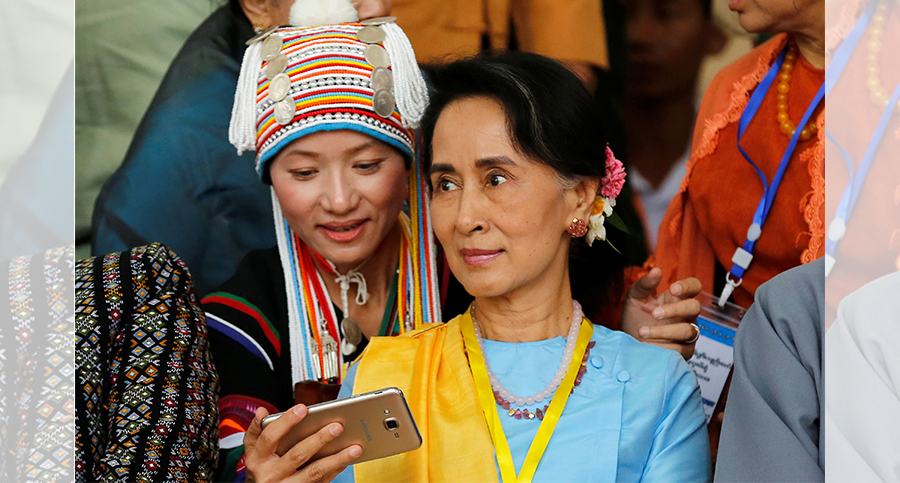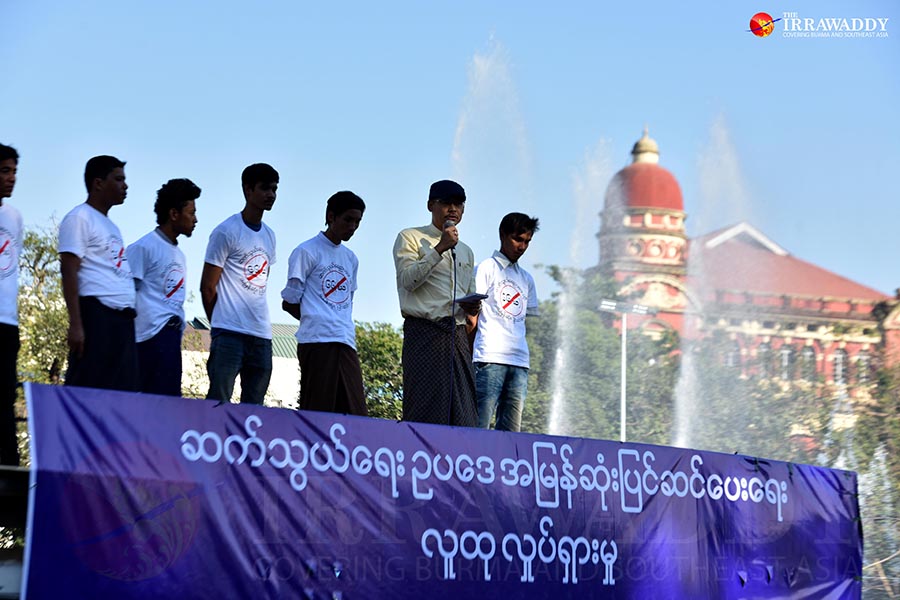BANGKOK, Thailand — When Nobel Peace Prize laureate Daw Aung San Suu Kyi and her long-persecuted National League for Democracy party won elected office in November 2015, bringing an end to nearly five decades of authoritarian military rule, many local journalists saw the democratic result as a de facto win for press freedom.
Burma’s previous military regimes imposed strict restrictions on the media, including a pre-publication censorship system that left any news or commentary even remotely critical of the junta or its commanding officers on news publications’ cutting room floors.
For decades, Burma was home to one of Asia’s most repressive media environments, where scores of journalists who dared to shirk the regime’s censorship orders—either under pseudonyms or by filing secretly to exile-run independent media—were sentenced to jail terms in abysmal and often brutal prison conditions.
While those restrictions started to lift under previous President Thein Sein, including an end in August 2012 to pre-publication censorship and the release in November 2012 of political prisoners, including many journalists, in a mass presidential amnesty, self-censorship endured because laws used to stifle free expression and punish dissent remained on the books. In 2013, Committee to Protect Journalists (CPJ)’s report “Burma falters, backtracks on press freedom,” found Thein Sein’s military-backed, quasi-civilian government lacked a genuine commitment to a more open press environment.
Now, one year into State Counselor Daw Aung San Suu Kyi’s de facto leadership, and despite hopes that the former political prisoner and pro-democracy icon would leverage her resounding mandate to roll back military power and strike down draconian laws, the situation for journalists has not materially improved, according to Burma-based journalists who spoke with the CPJ.
“Press freedom in our country is not really improving,” said Kyaw Zwa Moe, editor of the The Irrawaddy, a news group established by exiles that began operating from inside the country during Thein Sein’s term. “There is still limited space for independent media due to restrictive laws, [media] market monopoly, no clear policy for access to information, and media-unfriendly establishments and authorities.”
Presidential spokesperson Zaw Htay, who served the same role under Thein Sein, did not immediately respond to CPJ’s request for comment.

Kyaw Zwa says while Daw Aung San Suu Kyi’s NLD-led government has not imposed new restrictions on reporters, it has also not done enough to amend or abolish laws from the military era, including bans on reporting that could be deemed as threatening to national harmony and security. “The government has still failed to create an environment where independent media can practice their professions freely and ethically,” said Kyaw Zwa.
Chief among those laws is section 66(d) of the Telecommunications Law, a broad provision that carries potential three-year prison terms for cases of defamation over communications networks. While the law was used only occasionally against journalists under military rule, politicians, military officials, and even Buddhist monks are increasingly using it now to stifle online and social media criticism.
Journalists who endured the military regime’s pre-publication censorship say there is still a wide range of topics, including cases of high-level corruption, religious criticism, communal violence, and the military’s operations, activities and business dealings that are still largely taboo under Daw Aung San Suu Kyi’s democratic government.
They say the rising use of 66(d) has hamstrung them from reporting into alleged past corruption and abuses committed under the former junta. Burma PEN, a free expression group, estimates 55 Article 66(d)-related cases have been filed since the NLD took power, including charges filed against social media users who posted material critical of Daw Aung San Suu Kyi.
Ko Swe Win, chief reporter at the local Myanmar Now newspaper, was charged under 66(d) on March 7 for his critical reporting on a prominent radical Buddhist monk, U Wirathu, who in a Facebook post thanked the assassins who shot and killed a Muslim NLD legal adviser at Rangoon’s international airport in January. A week later, the reporter was stopped in the street by three men who had photos of him on their mobile phones and who acted in a threatening manner, according to reports.
The monk’s defamation case against Swe Win, filed by supporters of one of the radical Ma Ba Tha groups that he leads, has since been dropped. However, the Buddhist fundamentalist group the Patriotic Monks Union of Burma pressured the Ministry of Religious Affairs to pursue legal action against the reporter for allegedly defaming Buddhism, according to reports. It is an incendiary charge in the Buddhist-majority nation. Human rights activists have accused Ma Ba Tha of inciting communal violence against groups or individuals it views as a threat to Buddhism, according to media reports and rights groups. Wirathu has denied any role in the violence.
Politicians have also used the act to stifle media criticism. Eleven Media Group chief executive Than Htut Aung and chief editor Wai Phyo were detained on Nov. 11 under 66(d) over an editorial that alleged Rangoon’s chief minister might have been involved in corruption, according to reports. The journalists were held in pre-trial detention for nearly two months before they were released on bail. The results of the pending case will set an important precedent on the law’s use against the press.
“Section 66(d) is hugely problematic,” said Thomas Kean, editor-in-chief of Frontier, a local weekly English-language news magazine that he says has faced threats of legal action but no cases under the law. “It is so broad that anything we report could result in a complaint to police. We don’t actually spend too much time thinking about it because if you tried to avoid potential cases by self-censoring you would have little left over that you actually wanted to publish,” he said.

Other reporters and editors told CPJ that critical reporting on the military, completely banned under the junta, is still fraught under Daw Aung San Suu Kyi. That’s in large part because Burma’s transition to democracy remains incomplete, with the military maintaining autonomous control over the defense, home, and border affairs ministries and having a 25 percent appointed bloc in parliament.
The military has leveraged those residual powers to block reporters’ access to conflict zones, including a news blackout of a military operation in western Arakan State—imposed since October—that rights groups claim gave cover for rights abuses of ethnic Rohingya civilians. The government denies abuses were committed during the lock-down operation, which is now the subject of a United Nations human rights inquiry.
Authorities have blocked access to the region to enforce the blackout and threatened legal action against reporters who violate the ban. Reporters have been allowed access to certain areas in recent weeks, but only via two tightly controlled tours run by the government, Kean said.
“Reporters are not wholly free to report on military and security matters deemed as sensitive,” said Aye Aye Win, a recently retired Associated Press bureau chief who reported for decades under Burma’s military rule. “The fact that the NLD government has no control over the military and [lacks] political will to promote press freedom are the reasons [the] situation in Burma has not significantly improved.”
Reporters who question the official narrative also come under pressure. Presidential spokesman Zaw Htay singled out Myanmar Times investigations editor Fiona MacGregor on social media, including on the President Office’s official Facebook page, as “biased” against the government for a story she reported citing information provided by a local rights group that alleged around 30 Rohingya women had been raped by soldiers in a Arakan State village on Oct. 19, 2016.
MacGregor said she was fired by the privately owned English-language newspaper’s management days later for breaking company policy against “damaging national reconciliation and the paper’s reputation.” MacGregor told CPJ at the time that she felt Zaw Htay’s comments aimed to stifle local and foreign reporting on the alleged sexual violence and carried a tacit threat of possible criminal defamation charges.
Zaw Htay did not immediately respond to CPJ’s request for comment about her claims. Kavi Chongkittavorn, a senior editor at Myanmar Times, acknowledged CPJ’s emailed request for comment but the paper’s managers did not immediately respond.
The rape accusations have since been widely reported, including in a Reuters investigation published April 25 that interviewed several Rohingya women in refugee camps in Bangladesh who claimed they were sexually abused and raped by Burma security forces. Daw Aung San Suu Kyi told the United Nations in February she would investigate the allegations, according to news reports.
Still, local groups are pushing for positive change. On May 3, Burma PEN and 13 local media and rights groups released a one-year “scorecard” report assessing free expression conditions that found a “significant shortfall” in relevant reforms under Daw Aung San Suu Kyi’s watch. “The government has the power to promote media freedom and freedom of expression, but it hasn’t made it a priority,” the report concluded.
The report noted that the NLD-dominated parliament amended 19 and enacted 23 laws during its first year in power, including a new personal privacy and security law that aims to curb physical, though not online, state surveillance. Lawmakers also abolished the 1950 Emergency Provisions Act, the ex-military regime’s security law of choice for targeting dissidents and journalists, which had allowances for life in prison or even death for violations.
But with other repressive laws still on the books, including the 2013 Telecommunications Law, 2004 Electronics Transactions Law, and the 1923 Official Secrets Act, among others, that carry prison terms, Burma’s media is still susceptible to vague and arbitrary threats. “The NLD government is trying to reform laws, but based primarily on its own perceptions, not on international human rights standards,” the PEN report said.
This article was originally published by CPJ.
Shawn W. Crispin is Senior Southeast Asia Representative of CPJ based in Bangkok, Thailand, where he has worked as a journalist for more than 15 years. He has led CPJ missions throughout the region and is the author of several CPJ special reports.

















